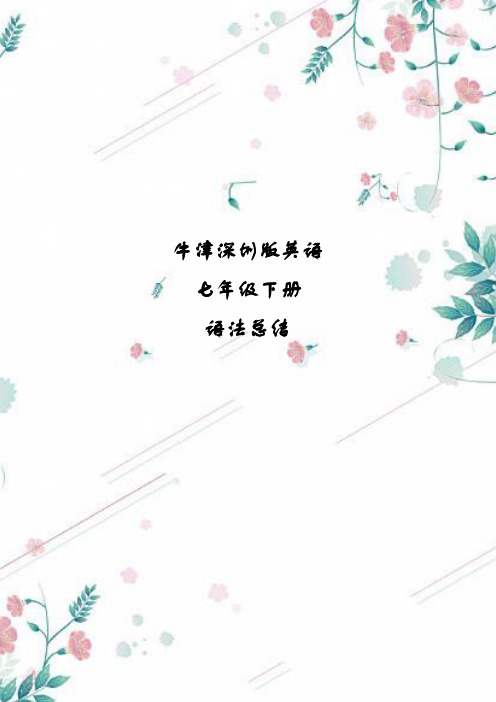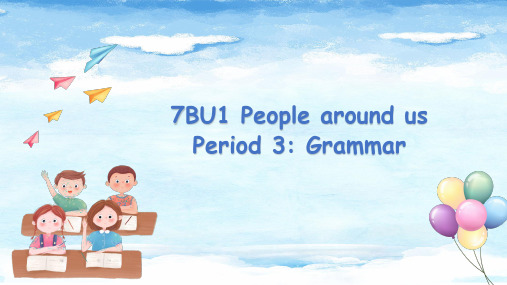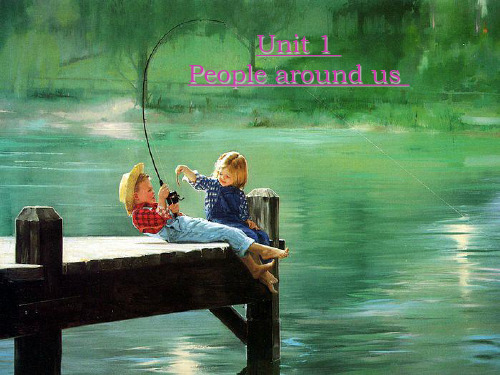最新版深圳牛津七年级英语下册第一单元语法冠词
期末语法总结牛津深圳版(广州沈阳通用)英语七年级下册(1)

牛津深圳版英语七年级下册语法总结目录一、定冠词和零冠词二、专有名词和连词三、反身代词和方位介词四、现在进行时五、表示数量的不定代词六、情态动词七、祈使句和感叹句八、时间状语从句第一单元定冠词和零冠词一、定冠词的用法1.特指上文提到过的、特定的人或事物,或谈话双方都知道的人或事物I have a cat. The cat is white我有一只猫。
这只猫是白色的Pass me the book, please请把那本书递给我2.用于自然界中表示独一无二的事物前The sun was shining brightly as we sailed down我们顺流而下时阳光很灿烂Man travelled to the moon scores of years ago几十年前人类就登上了月球3.用于序数词、表特指的比较级或形容词、副词最高级前This was the first time I was on a train这是我第一次乘火车The greatest talkers are always the least doers言语的巨人往往是行动的侏儒4.用于表示演奏的乐器名词前The boy of no more than four can play the piano very beautifully这个不过4岁的男孩钢琴弹得很好5.用于姓氏的复数形式前,表示全家人或夫妇两The Smiths went on a roundtheworld trip史密斯一家去环球旅游了The Whites are waiting for their daughter怀特夫妇正在等待他们的女儿6.用在某些由普通名词构成的专有名词及表示海洋、河流、山脉、群岛、国家和党派的专有名词前I have never been to the Great Wall我从未去过长城7.用于表示方位、地点、时间的名词前In every country the sun rises in the east太阳不分国别,永远升自东方We sometimes play football in the afternoon我们有时下午踢足球二、零冠词的用法1.表示泛指意义的物质名词、抽象名词、专有名词前通常不用冠词Happiness is a direction, not a place幸福是一个方向,不是一个地点China is one of the largest countries in the world中国是世界上最大的国家之一2.复数名词表示一类人或事物时,其前通常不用冠词Mistakes are often the best teacher错误常常是最好的老师3.表示星期、月份、季节和节日等名词前通常不用冠词Autumn is the harvest season of the year秋天是一年中收获的季节On Christmas Day the children often get presents from their parents在圣诞节,孩子们通常能收到父母给的礼物We go to school from Monday to Friday我们从星期一到星期五都上课4.在学科、语言、三餐、棋类名词和球类运动名词前不用冠词We learned arithmetic at primary school我们在小学学算术Do you have lunch at home or at school?你在家还是在学校吃午饭?I enjoy playing chess我喜欢下国际象棋Do you like playing basketball or rugby?你喜欢打篮球还是打橄榄球?5.by与表示交通工具的名词连用,表示一种交通方式时,名词前不用冠词Now many people want to travel by plane现在很多人想坐飞机旅行6.名词前已有指示代词、物主代词、不定代词或名词所有格等修饰时,不用冠词I like this picture better我更喜欢这幅画This is my address. Let’s keep in touch这是我的地址。
Unit1Grammar课件牛津深圳版英语七年级下册

bird
egg ruler umbrella hour UFO
a
an
不定冠词a/an
用在可数名词单数前,泛指一类人或事物。
a 用于辅音音素开头的单词前 an 用于元音音素开头的单词前
a flower an orange
字母u有点调皮,它有时候读/∧/,有时候读/ju:/
a UFO /ju:/
an umbrella /∧/
The woman with long and brown hair is my English teacher, Mrs Li.
Group work
In groups, try to describe the people and the things in your classroom with “the”. The more, the better.
定冠词 the
C.play + the + 乐器名词 play + 体育运动或娱乐活动名词
play basketball
play the drum
定冠词 the
D.D。the与短语连用,来描述特定的人或事物 。
the man in the purple suit
the woman in the red dress
play + 体育运动或娱乐活动名词
D. the与短语连用,来描述特定的人或事物。
Homework
Try your best to complete Bella’s story and use more a/an/the.
B.the 还可用于世界上独一无二的事物之前。
Just like us, during the Spring Festival, Bella has to stay at home and play with her family. This is her plan of indoor activities.
沪教牛津深圳七下第一单元语法冠词学案设计(无答案)

冠词复习Module 1 —Language Revision Tests1. ________ Great Wall is one of the seven wonders around the world.A. TheB. AC. /2. Lily practices playing __________ violin after school every day.A. aB. anC. the3. —You’ve dropped ________“s” in the word “necessary”.—Oh, the letter “s” is doubled.A. aB. anC. the4. To save time, many students have ________ lunch at school every day.A. aB. anC. /5. —Do you know 2019 is the year of the Pig?—Sure. The pig is________ twelfth sign in the Chinese zodiac cycle(生肖).A. aB. anC. the6. I have ________ eightmonthold sister and she is very lovely.A. aB. anC. the7. —Ben, is physics your favorite subject?—Yes, and it is ________ important one.A. aB. theC. an8. Hurry up! The concert will begin in ________ minute.A. aB. /C. the9. —The task is too difficult for me to finish.—Don’t worry. I’ll give you________ hand.A. aB. theC. /10. —Gina, it’s going to rain. Take ________ umbrella to school with you.—OK, Mom.A.aB. anC. the11. Papercutting is a traditional art of China. Many foreigners have ________interest in it.A. aB. anC. /12. This street is _____ oneway street. Many people hope it will be changed into twoway traffic.A. aB. anC. /13. —Tony,can you make ________ sentence with “have nothing against”?—No problem. It’s a piece of cake.A. /B. aC. an14. The bridge between the two islands is ________ longest one in this area.A. aB. anC. the15. The new study shows that going to ________ bed late is harmful to our health.A. /B. anC. the16. Song of Youth is such________ fantastic film that I have seen it twice.A. aB. theC. /17. Autumn is ________ beautiful season with fresh air and fallen leaves.A. /B. theC. a18. Hideandseek is________ interesting game for children.A. anB. theC. /19. Our friends are planning to have ________ picnic this weekend.A. aB. /C. the20. At ________ corner of the street, Tom met a cat and played with it.A. aB. theC. /21. My grandfather can’t remember where he put ________ newspaper he bought this morning.A. aB. theC. /22. He always drops ________ “o” when he writes the word “noodle”.A. anB. theC. /23. After she passed the entrance examination, she finally became _________ university student.A. aB. theC. /24. The man is driving at 40 kilometres _________ hour.A. anB. /C. the25. _________ panda is one of the animals in danger.A. AnB. TheC. /26. Yesterday I saw _______ film. It moved me deeply.A. aB. theC. /27. I had _______ unusual day on my last school trip.A. anB. /C. the28. Look at _______ eraser on the floor. Whose is it?A. anB. theC. /29. A new bridge has been built over ______ Huangpu River.A. aB. theC. /30. —Do you know how to spell _____________ word "expensive"in English?—Yes. It begins with _____________"e".A. the; aB. the; anC. a; an Module 2 —Language and UsageI.a/ an:不定冠词——泛指(核心意思“一”)1.一个;每一;又一1.There is a map on the wall.2.I bought an interesting book.3.I eat 3 meals a day.4.I failed 3 times. I want to try a fourth time.2.不定冠词a/an(1)区别:a用在以辅音音素开头的可数名词单数前;an用在以元音音素开头的可数名词单数前。
【最新】牛津深圳版七年级英语下册Unit1复习课件【词汇、短语、语法】(共56张PPT).ppt

cheerless (adj.无精打采的)
adv. cheerfully <-> cheerlessly
3. hard-working (a. 努力的,勤勉的) He works hard at all his subjects. He is a hard-working student.
4. take good care of … = look after … well
5. She died two years ago and I miss her very much.
die (v.死) dead (adj.死的) death (n.死亡)
1.The _d_e_a_t_h_of his dog made him sad. 2. The girl's mother __d_i_e_d__when she was five years old. 3. She was __d_e_a_d__ two years ago.
~ well-dressed; fashionable What a smart dress!
6. probably (adv. 很可能) ~ possibly
~ maybe (口头常用)
We’re probably returning home tomorrow.
7. forget (-forgot-forgotten) 忘记
6. They made a _s_u_c_c_e_s_s_f_u_l_ party last night. Everybody enjoyed it.
7. I need yours_u__p_p_o_r_t to work on it. It’s really hard for me to do it alone.
新牛津深圳版英语七年级下册第1单元知识要点

新牛津深圳版英语七年级下册第1单元知识要点新牛津深圳版英语七年级下册第1单元知识要点一、单词:1. smart 机敏的;聪明的(= clever )2. hard-working 工作努力的;勤勉的3. person 人(=human being;per;son)4. cheerful 快乐的;高兴的(=happy; cheerfully)5. forget 忘记( forgot; for; get )6. encourage 鼓励( courage勇气; encouragement )7. strict 严格的;严厉的8. successful 获得成功的( success n.; succeed v.)9. miss 想念;错过;丢失10. probably 很可能(= maybe; probable adj. ) 11. joke 玩笑12. support 支持(= give help; up; sport; port) 13. smell 气味;闻起来( smelt ) 14. paragraph 段落15. laugh 笑( cry; laugh at ) 16. remain 仍然是(= still be; main 主要的 ) 17. member 成员( remember 记得 ) 18. care 照顾;照料(careful; carefully; careless) 19. patient 耐心的;病人(= sick person; patience n.; pant; tie ; be patient with )二、词组:1. give up = stop 放弃2. take care of= look after 照顾;照料3. as well;too;also 也4. all day and all night 夜以继日5. be strict with sb 对某人要求严格6. be strict about/ in sth 对…严格要求7. tell jokes 讲笑话 8. make fun of = laugh at 取笑;嘲弄9. very much = a lot 非常 10. be good at = do well in 擅长于;在某方面好11. go to work 上班 12. be full of=be filled with 充满;装满;填满13. write…down 写下;记下 14. make friends with sb与某人交朋友15. think about 考虑;思考 16. in front of 在...的前面(外部)17. be successful in = have success in = succeed in 在...取得成功18. in/ around /all over the world 在世界上;遍及世界19. a short woman with grey hair 一个灰白头发的矮个妇女20. a tall girl with glasses 一个戴眼镜的高个女孩21. the person in blue jeans 穿蓝色牛仔裤的那个人22. be interested in = be keen on = be fond of = like 对…感兴趣三、句型结构:1. make sb do sth 使某人做某事2. make sb sth=make sth for sb给某人制做某物3. forget to do sth 忘记去做某事(未做)4. forget doing sth 忘记做过某事(已做)5. remember to do sth 记得去做某事(未做)6. remember doing sth 记得做过某事(已做)7. stop doing sth 停止做某事8. stop to do sth 停下来去做某事9. help sb with sth 在某方面帮助某人 10. help sb (to) do sth 帮助某人做某事11. keep doing sth. 不停一直做某事 12. advise sb to do sth. 建议某人做某事13. would like to do sth = want to do sth = feel like doing sth 想要做某事14. encourage sb to do sth 鼓励某人做某事 encourage = givea lot of hope重要句子:1. What do you think of Shenzhen? = How do you like Shenzhen? 你觉得深圳如何?2. What does he look like? = What is he like? 他长相如何?3. What does he do? = What is he? = What is his job? 他做什么工作?4. His dream is to play basketball in the NBA. 他的梦想是去NBA打篮球。
牛津深圳版初一下学期英语知识点总结知识分享

牛津深圳版初一下学期英语知识点总结Chapter One Travel一.课文重点词语与短语plan 计划 plan to do sth. 计划去做某事offer 提供 offer sb. sth. = offer sth. to sb.provide 提供 provide sth for sb = provide sb with sthshop 购物 shop for sth = buy sthWhy not do sth? =Why don’t you do sth 为什么不做…used to do sth 过去常常做某事be/get used to doing sth 习惯于做某事the same as…和…一样be famous for sth = be well-know for sth 以…闻名be famous as 作为…而著名help sb (to )do sth 帮助某人做某事help sb with sth 帮助某人做某事one of + 可数名词复数…之一,其中之一二.语法:冠词a,an,与the 的用法★不定冠词a/an的用法主要有:1.泛指表示"某一个",用于可数名词单数前。
如: We need a rent to live in. 2.与可数名词单数连用,表示类别。
如:1) I'm a student.(是学生而不是其他人。
)2) An elephant is much bigger than a tiger.3.在某些词组中,代替介词per,作“每一”讲。
如: twice a day, 5 dollars a kiloI play computer games once a week.注意: a /an 的区别a 用在辅音开头的单词前:a cat, a useful bookan 用在元音发音的单词前:an English book, an interesting story, an honest boy, an important party, an ugly man…★定冠词the的用法主要有:1. 表示特指某人或某物。
牛津深圳版七年级下册第一单元语法词汇

语法一.表示方位的介词on/to/in(接壤/分离/包含)的用法辨析在英语中常用介词to,on,in与方位词连用起来表示两地的位置关系,具体用法如下:1. to表示“(主语)在某特定范围之外”,两者不接壤,有湖泊、大海等相隔。
例:Tianjin is to the southeast of Beijing. 天津在北京的东南面。
2. on表示“两地接壤”。
例:Hebei province is on the north of Henan Province. 河北省在河南省的北面。
3. in表示“(主语)被包含在另一个范围之中”。
例:Qingdao is in the east of China. 青岛在中国的东部。
二.方位介词常考考点1. above/overover指在物体的正上方;above则指在高于某物的地方。
We are flying above the clouds. 我们在云层上面飞行。
There is a lamp hanging over the table. 桌子上方吊着一盏灯。
2. next to/nearnext to意为“在……旁边,紧挨着……”;near 意为“在……附近”。
My book is next to your book. 我的书在你的书旁边。
There is a tree near our school. 我们学校附近有一棵树。
3. behind/in front of/in the front ofbehind表示“在……后面”;in front of表示“在某物外部的前面”;in the front of表示“在某物内部的前面”。
Winnie hides herself behind the curtain. Winnie躲在了窗帘的后面。
They are singing in front of the audience. 他们正在听众面前唱歌。
I'd like a seat in the front of the plane. 我想要靠飞机前段的的座位。
深圳牛津英语七年级下第一单元(可编辑修改word版)

深圳牛津英语七年级下第一单元基础知识I.重点词组:1.national flag 国旗2.summer holidays 暑假3.spread one’s wings 展翅高飞4.go skiing 滑雪5.grow crops 种植庄稼6.the most scenic areas 景色最优美的地区ed to do sth 过去常常做某事8.famous attractions 著名的景点9.the Arc de Triomphe 凯旋门the Loire Valley the Eiffel Tower 卢瓦尔河谷10.the same…as和……一样11.art and culture 艺术和文化12. exhibitions and concerts 展览和音乐会13 . start to plan 开始计划14. such as 例如15. why not 为什么不16.with coasts on three sides 三面环海17. in central France 在法国中部18.one of the most beautiful cities 最美丽的城市之一19. .an hour from 距离…..一小时的路程20.be famous for 以而闻名21.film festivals 电影节22.better understand 更好的理解II.重点知识点:1.Why not do sth? = Why don’t you do sth?;2.such as 与for example 的区别;ed to do sth 过去常常做某事be/get used to (doing) sth 习惯做某事be used to do sth = be used for doing sth;被用来做某事4.one of +形容词最高级+可数名词复数;5.offer sb sth = offer sth to sb 提供某人某物offer to do sth;主动提出做某事6.the same+名词+as….= as +形容词+as……..7.be famous for 以….闻名be famous as;作为….而闻名8.help sb (to) do sth/help sb with sth 帮助某人做某事9.enjoy oneself = have a good time.玩得开心10.go+v-ing.去做…….III.重点语法点:1.专有名词2.冠词3.问路和指出方向4.邮政卡片的写法IV.解释句子本章考点:Why not do sth? = Why don’t you do sth?;be famous for = be well-known forhelp sb (to) do sth = help sb with sthvisit = go/be on a visit toenjoy oneself = have a good timeWhat do you mean by…? = What’s the meaning of …?plan to do sth = mean to do sthV.课后练习1.按要求写单词.1.French(名词)II.词组运用(一)基础篇:2.cross(介词)3.different(反义词)1. 暑假3. 展翅高飞5. 以…而闻名7. 去滑雪9. 距离…一小时11. 更好地理解2. 例如4. 过去常常做某事6. 为何不8.与…相同的10. 电影节12.艺术和文化13.最美丽的城市之一14.在法国中部15. 开始计划16. 景色最优美的地区III.根据句意及首字母填空。
- 1、下载文档前请自行甄别文档内容的完整性,平台不提供额外的编辑、内容补充、找答案等附加服务。
- 2、"仅部分预览"的文档,不可在线预览部分如存在完整性等问题,可反馈申请退款(可完整预览的文档不适用该条件!)。
- 3、如文档侵犯您的权益,请联系客服反馈,我们会尽快为您处理(人工客服工作时间:9:00-18:30)。
最新版深圳牛津七年级英语下册第一单元语法冠词一、定义冠词是一种虚词,不能在句子中作独立成分,要用在名词的前面,帮助说明名词所指的人或事物。
它不能离开名词而单独存在,因此,可以说冠词就是名词的一种标志。
在英语中,冠词分为不定冠词(a和an)和定冠词(the)两种:不定冠词一般用于单数名词前,表示泛指; 定冠词既可修饰可数名词(单复数均可),又可修饰不可数名词,表示特指。
用法分类详解1. 不定冠词a(an)1. 有些单词虽然是以辅音字母开头,但使用不定冠词an。
如:hour和honest 以辅音字母h开头,但h并不发音,因此用an。
2. 有些单词虽然是以元音字母开头,但使用不定冠词a。
如:useful和university 以元音字母u开头,但u发/ju:/音,故使用a。
3. 表示成套的东西时,两个并列的名词前只能用一个不定冠词。
如:a knife and fork一套刀叉 a table and chair 一套桌椅4. 不可数名词前一般不用冠词,但如果具体化,表示一个具体的情况、动作或某一类事物时,可以用不定冠词a或an。
如:—Have a smoke抽支烟吧—No,thanks. I gave up smoking long time ago. 不了,谢谢,我早戒了。
Tom started at a walk but soon broke into a run. 汤姆开始时步行,但一会儿就奔跑起来了。
1. (2015邯郸一模) Come on! You can make it if you have ______ try.A. aB. anC. theD. 不填2. (2015保定一模) There is ______ house in the picture. It’s big and nice.A. aB. theC. 不填D. an3. (2015石家庄裕华区模拟) —Look at ______ old desk. Is it still ______ usable one —Yes. It can be used to store our books.A. an; theB. a; theC. the; anD. the; a4. (2015邯郸二模) Each of us plays ______ important role in our society.A. aB. anC. theD. /5. (2015唐山路北区一模) I am considering buying ______ used car for its lower price.A. anB. aC. theD. /6. (2015张家口一模) His father bought ______ bike for him.A. aB. anC. theD. /7. (2015唐山路北区二模)—What ______ heavy rain it was!—Yes, but I love ______ air after it rains. It smells so fresh.A. the; aB. a; theC. the; theD. a; a8. (2015沧州一模) If you read the article for ______ second time,you will have ______ betterunderstanding of it.A. a; theB. /; theC. a; aD. /; a2. 定冠词the9. (2015河北) Look at ______ calendar. It’s June 22.A. aB. anC. theD. /10. (2015石家庄毕业班质量检测) —Mum, I want to buy a new toy car.—But ______ old one is still running, isn’t itA. anB. theC. aD. /11. (2015石家庄藁城区模拟) —Is ______ red bag under the table yours,Jean —No. I only have ______ yellow bag. Maybe it’s Julia’s.A. a; theB. the; aC. a; aD. the; the12. (2015石家庄43中模拟) Many people like ______ TV play You Who Came From theStars very much.A. aB. anC. theD. /13. (2015河北模拟拔高型) ______ old man behind Mrs. Li is ______ university teacher.A. The; anB. An; aC. An; anD. The; a14. (2015河北结课B卷) Shijiazhuang is ______ capital city of Hebei Province. It is becomingmore and more beautiful.A. aB. anC. theD. 不填15. (2015河北密卷一) ______ Smiths often go for ______ picnic on weekends in spring.A. The; aB. A; theC. /; theD. The; /16. (2015滦平县二模) —Mary, can you play ______ guitar—Certainly! It’s a piece of cake for me.a B. an C. the D. 不填3. 不用冠词的情况1. 如果三餐名词之前有定语修饰时,可加不定冠词。
如:We had a wonderful lunch. 我们吃了一顿很好的午餐。
He gave me a good supper. 他请我吃了一顿丰盛的晚餐。
2. 如果特指某顿饭时,可加定冠词。
如:The supper was different from that one. 这顿饭和那顿饭不同。
How do you like the dinner they gave你们觉得他们提供的饭怎么样3. 如果季节、月份或日期名词被一个限定词修饰时,前面可加定冠词。
如:He came to Beijing in the winter of 1999. 他是1999年冬天来北京的。
I bought the bike in the May of 2014. 这辆自行车是我2014年的5月份买的。
4. 由festival组成的中国特有的节日前要加定冠词the。
如:the Spring Festival 春节; the Lantern Festival 元宵节。
5. 某些短语中有无冠词the,意义会大不相同。
如:(1)go to school去上学; go to the school到(所指的)学校去(2)at table用餐,在吃饭; at the table在桌边(3)in hospital生病住院; in the hospital 在医院里(并非生病住院)(4)in front of在……前面(范围之外); in the front of 在……前部(范围之内)(5)by sea(=by ship)乘船,走水路; by the sea 在海边(6)in class在上课; in the class在班上(7)in place of替代; in the place of 在……地方17. (2015石家庄长安区一模) The little boy is so ______ honest that all of us like him.A. aB. anC. theD. /18. (2014石家庄42、43中一模) More and more foreign students come to China to learn______ Chinese.A. aB. anC. theD. /19. (2014邢台二模) Li Yundi plays ______ piano after ______ supper every day.A. the; theB. a; aC. the; /D. /; the20. (2014秦皇岛一模) —What’s the matter with you—I caught ______ bad cold and had to stay in ______ bed.A. a; /B. a; theC. a; aD. the; the21. (2014辛集四模) —Are you ______ Chinese or Japanese—Chinese. But I was born in Japan.A. anB. /C. theD. one22. (2014邢台二模) —What do you like to do after school—I like playing ______ chess with my father.A. aB. anC. theD. /Practice1. David is from ______ European country and he is ______ honest boy.A. a; aB. a; anC. an; aD. an; an2. Beijing is ______ capital of China and it is ______ city with many places of interest.A. a; aB. a; theC. the; aD. the; the3. Long long ago there was ______ old king,and he has a very beautiful girl.A. aB. anC. theD. /4.—What was Professor Wang doing at this time yesterday—She was giving her students ______ lesson on ______ history.A. a; /B. a; anC. the; theD. the; a5.—How about ______ talent show—I should say it was ______ great success.A. a; aB. an; anC. an; theD. the; a6. Li Na started playing ______ tennis at the age of six. She is one of ______ best womentennis players in the world.A. the; theB. a ; /C. /; theD. the; /7. —Tom, I’ll invite you to have ______ lunch after playing ______ violin.—Thank you.A. a; theB. the; theC. /; /D. /; the8. He has tried twice,and he is asked to have ______ third try.A. theB. aC. anD. /9.—Excuse me. Do you have any books about ______ moon—Yes, they are on ______ shelf over there.A. a; aB. a; theC. the; /D. the; the10. I like playing ______ chess,while my brother is interested in listening to ______ music.A. /; /B. the; theC. the; /D. a; the11. There is ______ airport in our city,and it is ______ first one in our province.A. a; theB. an; /C. a; /D. an; the12. —T here’s ______ ball on the ground. Would you please pass ______ ball to me —With pleasure.A. the; theB. the; aC. a; aD. a; the13. We have raised a lot of money for ______ poor in our country.A. anB. /C. aD. the14. We usually go to ______ school on weekdays,and sometimes go to ______cinema atweekends.A. /; theB. the; theC. the; /D. /; /15. —How long does it take us to go to your hometown from here—It takes you ______ hour or more to go to my hometown by ______ train.A. an; aB. a; aC. an; /D. a; /16. Jack is ______ unusual boy. He always has some different ideas from others.A. aB. anC. theD. /17. —Look!There is ______ useful book on the desk.—______ book must be Lucy’s. She left there just now.A. a; TheB. the; TheC. an; TheD. an; A18. —Can Xie Xiaojun play ______ piano—Yes. She can play a little. She has made ______ decision to learn to play more music.A. the; theB. a; aC. a; anD. the; a19. Look at ______ eraser on the floor. Whose is itA. aB. anC. theD. /20. Let’s look at the bag. Can you see ______ “s” on the corner of ______ bagA. /; theB. an; theC. the; aD. the; /一、用适当的冠词填空1. Thomas Edison was one of ____ greatest inventors in ____ world.2. Man is ____ only animal that can talk.3. Is this house ____ older of the two4. ____ earth moves around ____ sun.5. I live in ____ northeast of China.6. There are sixty minutes in ____ hour.7. ____ honest boy is Jim, ____ friend of mine.8. Children usually go to ____ school at ____ age of seven.9. Here is ____ useful book to read.10. Would you like ____ rice or ____ bread for your breakfast11. ____ poor are always happier than ____ rich.12. He took me by ____ hand.13. They have ____ son and ____ daughter. ____ son is a doctor and ____ daughter is a teacher.14. ____ orange is orange.15. He watched the student from ____ head to ____ foot.16. What ____ interesting book it is!17. ____ clouds over ____ sea were lovely yesterday.18. There is ____ little milk in the fridge, I’ll go and buy some.二、用括号内所给单词的适当形式填空。
